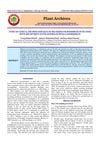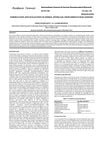 February 2024 in “Plant Cell Reports”
February 2024 in “Plant Cell Reports” AtVPS29 is essential for proper plant growth by regulating gibberellin signaling.
Natural products may help treat hair loss by promoting hair growth with fewer side effects.
 August 2023 in “Journal of Cosmetic Dermatology”
August 2023 in “Journal of Cosmetic Dermatology” Some plants like spinach, broccoli, and matcha may boost the effectiveness of the hair growth drug minoxidil.
 August 2023 in “Journal of Dermatological Treatment”
August 2023 in “Journal of Dermatological Treatment” Mesotherapy might improve hair growth, but more research is needed to confirm its safety and effectiveness.
 11 citations,
October 2020 in “Plant biotechnology journal”
11 citations,
October 2020 in “Plant biotechnology journal” Overexpressing SIMK in alfalfa boosts root hair growth, nodule clustering, and shoot biomass.
March 2020 in “Upravlìnnâ, ekonomìka ta zabezpečennâ âkostì v farmacìï” The "Flavosterol" emulgel meets quality standards for treating hair loss.
 3 citations,
February 2015 in “Scientific Research and Essays”
3 citations,
February 2015 in “Scientific Research and Essays” The study showed that brown planaria can be used to cheaply test if local plants can stop cell growth.
4 citations,
January 2010 in “Elsevier eBooks” Natural ingredients are seen as safe and effective in cosmetics, and plant tissue culture is becoming key for ingredient supply.
 6 citations,
May 2018 in “Plant Cell, Tissue and Organ Culture (PCTOC)”
6 citations,
May 2018 in “Plant Cell, Tissue and Organ Culture (PCTOC)” Adding yeast extract and methyl jasmonate to Eclipta alba cell cultures increased the production of the compound wedelolactone.
 14 citations,
March 2019 in “Plant methods”
14 citations,
March 2019 in “Plant methods” The new microrhizotron tool effectively observes and measures pepper plant roots non-destructively.
 August 2023 in “Vittalle”
August 2023 in “Vittalle” Mais estudos são necessários para garantir a eficácia e qualidade dos tratamentos de alopecia com plantas medicinais.
 6 citations,
March 2014 in “Herba Polonica”
6 citations,
March 2014 in “Herba Polonica” Plant extracts may help treat hormone-related hair loss.
 January 2021 in “Plant Archives/Plant archives”
January 2021 in “Plant Archives/Plant archives” Dogs with ear infections have a higher rate of yeast infection, especially German Shepherds, with seasonal variations observed.
13 citations,
May 2021 in “FASEB bioAdvances” Plant-based products can improve hair and skin health without harmful side effects.
 June 2022 in “International Journal of Advanced Research in Science, Communication and Technology”
June 2022 in “International Journal of Advanced Research in Science, Communication and Technology” The polyherbal hair oil helps hair growth, darkens white hair, fights dandruff, and makes hair shiny.
 2 citations,
December 2021 in “ScienceRise”
2 citations,
December 2021 in “ScienceRise” The best way to extract oil from Urtica dioica roots is by using corn oil, a 1:5 ratio of raw material to extract, extracting for 6 hours, and using the maceration method.

The hydrogel with 20% Hibiscus rosa-sinensis extract was the best for potential therapeutic use.
 22 citations,
August 2019 in “Environmental research”
22 citations,
August 2019 in “Environmental research” Pseudomonas sp. T5-6-I bacteria increase selenium uptake in Brassica oleracea plants by 130%.
 3 citations,
December 2018 in “PubMed”
3 citations,
December 2018 in “PubMed” Most over-the-counter hair loss treatments lack strong evidence of effectiveness and are not FDA-approved.
 2 citations,
July 2023 in “Plant Disease”
2 citations,
July 2023 in “Plant Disease” Some maize lines resist stalk rot better due to specific genes and enzyme activities.
466 citations,
June 2009 in “Experimental dermatology” We now understand more about what causes acne and this could lead to better, more personalized treatments.
December 2024 in “International Journal of Scientific Reports” The plant-based hair serum is a promising and safe alternative to minoxidil for hair regrowth.
 1 citations,
April 2021 in “Plant Archives/Plant archives”
1 citations,
April 2021 in “Plant Archives/Plant archives” Onions may help reduce cancer risk and obesity-related issues.
 December 2023 in “International Journal of Science and Research (IJSR)”
December 2023 in “International Journal of Science and Research (IJSR)” Herbal treatments are effective and preferred for hair loss with fewer side effects.
1 citations,
February 2024 in “Diversity” African plants can treat hair issues and may help with diabetes.
 1 citations,
September 2023 in “Molecules (Basel. Online)”
1 citations,
September 2023 in “Molecules (Basel. Online)” Plant sterols have health benefits like lowering cholesterol, but more research is needed to understand their effects and improve their extraction and sustainability.
 2 citations,
November 2022 in “Frontiers in Pharmacology”
2 citations,
November 2022 in “Frontiers in Pharmacology” Local healers in Addis Ababa use 81 medicinal plants, mainly from the Asteraceae family, to treat skin and general diseases, with Echinops kebericho being an endangered plant important in their practices.
 19 citations,
February 2023 in “Environmental and experimental botany”
19 citations,
February 2023 in “Environmental and experimental botany” Jasmonic acid helps plants grow, defend against threats, and survive stressful conditions like drought and salt.
 June 2022 in “Jurnal Health Sains”
June 2022 in “Jurnal Health Sains” Certain plant extracts may help treat hair loss and promote hair growth.
 December 2022 in “Journal of Experimental Biology and Agricultural Sciences”
December 2022 in “Journal of Experimental Biology and Agricultural Sciences” Using certain plant growth regulators together improves the cloning of the medicinal plant Eclipta alba.























